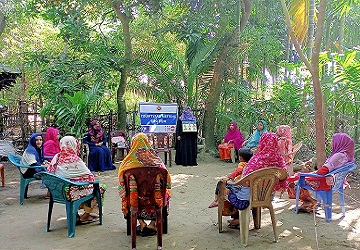WASH
RTMI is highly experienced in the WASH (Water,
Sanitation, and Hygiene) sector, focusing on implementing projects that
are designed to address critical public health issues and the risks from
waterborne diseases. The organization has operated in various
intervention settings, particularly in high-risk and low-resource areas
that struggle to access safe drinking water, sanitation, and hygiene
practices. The foundation of RTMI’s work lies in thorough research and
engagement with relevant communities, employing evidence-based Water
Resource Hygiene to identify and address the root causes of WASH-related
deficiencies. In collaboration with the Johns Hopkins Bloomberg School
of Public Health, RTMI supports two core activities aimed at combating
cholera: Cholera Prevention and Water, Sanitation, and Hygiene
interventions.
The "Ring Water,
Sanitation, and Hygiene Intervention to Reduce Cholera in Hotspots in
Bangladesh" aims to reduce cholera transmission among high-risk
populations in Dhaka by building on the CHoBI7 WASH intervention, which
promotes handwashing with soap and water treatment through pictorial
modules and mobile health messages. The project implements a ring-shaped
intervention around cholera patients’ households, evaluating the
efficacy of targeted WASH measures during the critical one-week
high-risk period post-diagnosis through randomized controlled trials
(RCTs), compared to standard messaging for diarrhea patients. Household
members are recruited within 36 hours of the index cholera patient’s
enrollment, with households visited at five time points (Days 1, 3, 5,
7, and 9) for clinical and environmental surveillance. Clinical
surveillance includes reporting diarrhea or vomiting and collecting
fecal specimens to test for Vibrio cholerae, while environmental
surveillance involves testing household water sources and stored
drinking water for Vibrio cholerae and free available chlorine. The
primary outcome is cholera infection within one week, defined by a
positive bacterial culture and/or a fourfold rise in vibriocidal
antibody titer. Secondary outcomes over 12 months include diarrhea
prevalence, child growth, handwashing with soap, Vibrio cholerae and
chlorine levels in stored drinking water, and changes in WASH-related
psychosocial factors. The hypothesis is that the CHoBI7 intervention
will reduce cholera infections and other diarrheal diseases among those
near cholera patient households and increase WASH behaviors.
The
"Testing a Scalable Model of the Cholera Hospital-Based Intervention"
project expands the CHoBI7 framework by addressing both urban and rural
settings. This initiative aims to adapt and scale the CHoBI7 program for
delivery in rural areas, tailoring the intervention to community
clinics and district health facilities. Spanning the Dhaka, Narayanganj,
Munshiganj, and Manikganj districts, the project includes research
activities to assess feasibility and stakeholder engagement, followed by
intervention implementation and evaluation. The scalable version of the
CHoBI7 program is expected to provide only a soapy water bottle and
chlorine tablets, encouraging households to construct handwashing
stations and water vessels using items from their homes. The study is
divided into two phases: (1) Formative Research Phase (12 Months): This
phase tailors the CHoBI7 program for rural health facilities and tests
the feasibility of providing a modified WASH package with only a soapy
water bottle and chlorine tablets in both urban and rural settings
through formative research and stakeholder engagement; (2) Intervention
Implementation and Evaluation Phase (18 Months): This phase evaluates
the effectiveness of delivering the CHoBI7 program in community clinics,
district hospitals, tertiary hospitals, and sub-district health
complexes in rural areas, focusing on increases in WASH behaviors and
decreases in diarrheal disease through a randomized controlled trial
(RCT).
-
Current Information
-
Activities Pictures
RTM International are implementing Health Support and research activities in the different Districts of Bangladesh which are funded by different Donors.
RTMI-UNFPA Project

Courtyard meeting organized by RTMI-UNFPA
